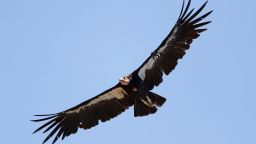The US Department of Agriculture’s?Animal and Plant Health Inspection Service, known as APHIS,?said it is?taking steps toward vaccinating?endangered California condors against a highly infectious bird flu that has led to the death of millions of birds in the United States.
For years, wildlife conservationists have been working to save the bird and have brought it from the brink of extinction, but?more than a dozen condors?in the US have been killed in the latest outbreak of bird flu, setting the conservation efforts back by a decade or more, experts said.
The US Fish and Wildlife Service asked APHIS about the possibility of vaccination after a California condor was found dead in late March, the USDA said?Tuesday. APHIS granted the emergency approval since the birds are “critically endangered, closely monitored, and their population is very small which allows close monitoring of the vaccine to ensure it is administered only to the approved population,” it said in a statement.
A vaccine has never been used against highly pathogenic avian influenza?in the US,?according to the USDA.?This vaccine is a killed inactivated product that was conditionally licensed by APHIS in 2016.
It is unclear when vaccinations will start.?Because the vaccine has not been tested in this species or against this strain of the virus, the US Fish and Wildlife Service will fund a pilot program to test its safety in North American vultures, a similar species, in North Carolina this month.
As of May 5, all confirmed bird flu cases in California condors have been found in northern Arizona. There have not been cases confirmed in the condor populations in Utah, California or Mexico, according to US Fish and Wildlife.
Globally, there are just over 500 California condors left, according to the?International Union for Conservation of Nature’s?Red List?of Threatened Species.?
The vaccine emergency authorization is limited to California condors. The USDA and a handful of universities have been working on a vaccine that could?possibly?be used?in poultry?if a vaccine is considered necessary.
A vaccination program for other birds would come with?several complications. Birds that are vaccinated could still shed some virus that could infect unprotected birds, logistics are difficult, and for poultry, it would be difficult to sell birds overseas because most countries will not accept exports from countries that vaccinate.
For now, most poultry experts prefer to control the disease with close surveillance and eliminating birds that are sick.
This is the worst avian flu outbreak in the US, but improved biosecurity has reduced the number of detections in the commercial bird industry compared with previous outbreaks, the USDA said.
Still, nearly 58.8 million poultry have been affected, and bird flu has been detected in more than 6,800 wild birds and dozens of since January 2022, according to the US Centers for Disease Control and Prevention.
Human cases are still rare. Only one person in the US has been known to have gotten sick in this outbreak.


